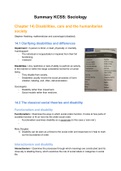Summary KCSS: Sociology
Chapter 14) Disabilities, care and the humanitarian
society
Stephen Hawking: mathematician and cosmologist (disabled).
14.1 Clarifying disabilities and differences
Impairment = A person is blind, or deaf, physically or mentally
‘handicapped’.
- The individual is incapacitated or impaired from their full
functioning.
- ‘medicine’
Disabilities = Any restriction or lack of ability to perform an activity
in the manner or within the range considered normal for a human
being.
- They disable from society.
- Disabilities usually involve the social processes of norm
violation, labeling, and, often, dehumanization.
Sociologists:
- Disability rather than impairment.
- Social models rather than medicine.
14.2 The classical social theories and disability
Functionalism and disability
Functionalism = Examines the ways in which social orders function. It looks at how parts of
societies function or fit (or not) into the wider social order.
- Functionalism examines disability as a social role (in this case a ‘sick role’).
-
Mary Douglas:
1) Disability can be seen as a threat to the social order and responses to it help to mark
out the boundaries of order.
Interactionism and disability
Interactionism = Examines the processes through which meanings are constructed (and its
close ally is labelling theory, which examines the role of social labels or categories in social
life.
, - Interactionism sees disability as a social category and as an emerging meaning.
- Socialists examine the ways in which it works in societies: how it emerges in
situations and what it might do to people who are ‘labelled’ as disabled.
Ervin Goffman:
1) Stigmas break down normal and routine interaction.
2) Disabilities generate interaction problems.
Conflict theory and disability
Conflict theory = Looks at different interests in society and how frequently some interests
come to dominate, oppress, or exploit others.
- Conflict theory sees disability as located within a system of different conflicts and
interests, and it is seen most commonly as an experience that is discriminated
against and oppressed.
Mark Hyde:
Disabled people…
1) experience profound levels of economic disadvantage.
2) have a poor quality of life.
3) are dependent on social services and benefits.
4) are often segregated by welfare programs.
5) are subject to a significant level of state regulations.
6) experience discrimination.
Mike Oliver’s The Politics of Disablement:
1) The difficulties, subordination, and conflicts of disabled people take on different
patterns in different societies, and within capitalism, they are often seen as
threatening to the routine world of hard work and money-making.
The consequences of being a disabled woman in society are proven to be harsher than
being a disabled man. Disabled women have fewer chances in society than disabled men.
14.3 Stigma and outsiders: cultural responses to disabilities
Labelling theory = Suggests the importance of categorizing and labelling in social life.
- Words and practices can stigmatize, shame, and exclude people from the normal
world. They construct ideas of some people being ‘the other’ - different from you.
- Responses help shape this phenomenon/ into reality.
Stigmatizing labels facilitate the hierarchy, division, and ordering of society by excluding
some people from society through borders and boundaries.
A short history of responses to disabilities
The stigmatization of the disabled has a long history. They've been demonized, medicalized,
and turned into entertainment.






